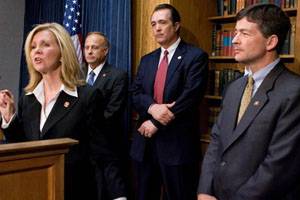ADAMS: Democracy prevails over bailout’s approval

Chairman of of Republican Study Group Rep. Jeb Hensarling, R-Texas, right, watches Rep. Marsha Blackburn, R-Tenn., left, speak during a news conference on Capitol Hill Monday, Sept. 29, 2008, in Washington. With Hensarling are Rep. Trent Franks, R-Ariz., second from right, and Steve King, R-Iowa. Photo: Associated Press/Manuel Balce Ceneta
September 29, 2008
In July 1959, Jimmy Carter famously said that Americans were experiencing “a crisis of confidence” in the efficacy of their government and democracy itself. He stated that this erosion of confidence, based largely on the fact that a majority of Americans felt that the next five years would be worse than the last, threatened to destroy “the social and the political fabric of America.”
Nearly fifty years later, many Americans are again fearful that our best times are behind us. Our crisis, however, is a “crisis of credit” which threatens to destroy not our social and political fabric, but rather our economic fabric.
The national news media familiarized America with the number 700 billion, and it seemed that a “financial rescue package” would be passed early this week, possibly even in time for the stock market’s opening bell on Monday.
On Sept. 26, President Bush confidently stated that legislators would “rise to the occasion” and view the issue as a non-partisan no-brainer. Bush’s predictions were proven false Sept. 29. Representing the worst legislative defeat of Bush’s presidency, the vote clearly illustrated that his power of persuasion, once so strong with respect to legislation on Iraq and wiretapping, is now virtually non-existent.
The bailout fell 13 votes short, with a 228-205 defeat. Breaking it down by party, 140 Democrats supported the bill and 95 voted against it; 65 Republicans opposed it, while 65 approved. With respect to Iowa, Representatives Bruce Braley (D), Tom Latham (R), and Steve King (R) voted against the bill, while Representatives Leonard Boswell (D) and Dave Loebsack (D) support it.
So why did it fail?
Taking aim at Bush and guilty-by-association Republicans, House Speaker Nancy Pelosi (D-Calif.) charged that all present economic problems could be blamed on “failed Bush economic policies – policies that were built on budget recklessness… combined with an anything goes economic policy.”
While much blame may be rightfully attributed to government policies of the past, Pelosi clearly created a non-cooperative, adversarial environment on the House floor, possibly causing many Republicans who would have supported the bill to reverse their votes.
As House Minority leader John Boehner (R-Ohio), claimed, “I do believe we could have gotten there today if it had not been for this partisan speech the speaker gave on the floor of the House.”
Pelosi’s partisan speech, which one commentator analyzed as only changing the minds of a dozen or less Republicans, was clearly not at the root of this bill’s defeat. The fact is that a third of Democrats and two-thirds of Republicans did not vote for the bill.
While most bills are passed or defeated without the typical American knowing it, the national news media ensured that the typical American citizen knew about this vote well before Monday. And citizens, hearing that a potential 700 billion of their tax dollars would go to fiscally irresponsible Americans and to a largely socialized economic future, spoke up.
As was reported from Capitol Hill, voters bombarded congressional offices with phone calls until just minutes before the bill’s vote. While some calls likely came to those Republicans and Democrats who supported the bill, hundreds came to the offices of those who voted against it.
Thus, having to face these constituents in five short weeks, a great number of representatives chose to listen to those who would hold them accountable rather than their party leaders.
Countless Republicans stated that their constituents felt worried about any bill that contained such a huge amount of funds and would put such a huge piece of the American economy under the control of the government.
As Iowa Representative Bruce Braley (D) said, “I cannot support a multi-billion dollar handout to Wall Street that fails to adequately protect the interests of Iowa taxpayers, and short-changes Iowa families.”
Iowa’s Steve King (R), concluded that “Doing ‘something’ is not enough, we must do the right thing.”
From the Democratic side, Representative Elijah Cummings (Md.), stated that “There’s a real sense of frustration. People see their tax dollars spent bailing out financial institutions, and they themselves are not doing well.”
And perhaps, then, this vote is not necessarily as bad as the media has made it seem thus far. Perhaps a better bill will come out of this. Perhaps, with Freddie and Fannie still foreclosing at high rates, Secretary Paulson should not be put on a throne as the omnipotent and omniscient king of American economics. Perhaps, I dare say, there should be no bailout at all, and the market should be left to run its course.
I, like the majority of Americans, do not know the answer. Regardless of what follows, the “nay”-sayers, at least for now, got it right.
What is important, however, is that democracy did its job. Citizens spoke up and were heard.






